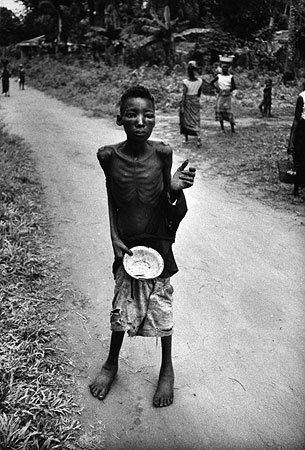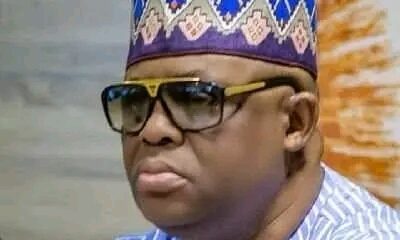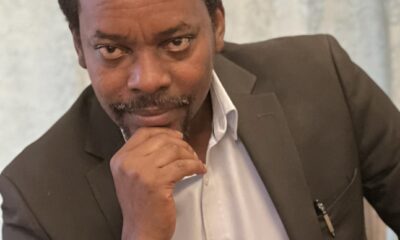National Issues
The Nigerian Civil War and Lessons Unlearnt -By Rotimi Opeyeoluwa


Sixteen-year-old Igbo boy, Biafra, Nigeria, 1968
“Nigeria is not a nation but a noyau-i.e., a society of inward antagonism, one held together by mutual internal antagonism, one which could not carry on if its members had no fellow members to hate. And if we want to end the troubles of the Nigerians, we must dig deeper to find the fundamental causes.” – Chinweizu.
President Franklin Roosevelt famously declared on December 7, 1947, a day when Japanese aircrafts attacked Pearl Harbour, that it was ‘a date that will live in infamy’. There are dates that stand out in the annals of countries and cannot be easily forgotten. For Nigeria, amongst several dates are October 1, January 15, July 29, May 29 and May 30. The latter was the date, in 1967, when the oratorical Emeka Ojukwu, then a 33-year old military officer, Colonel, and governor of Eastern Nigeria, declared his intention to pull the region out of the federation of Nigeria.
It is trite to say that as a political historian and avid reader of books on the political evolution of Nigeria, I am particularly enamoured and appreciative of the place, premium and importance of documenting the roles and events that pertain to national importance, with the sole aim of recording the factuality of events and placing them before succeeding generations. That way, a nation can guard against historical revisionism which distorts truth, as the cancer that attacks truth. As a matter of fact, a great failing on our part is that we do not remember enough as a people, any wonder that we move from one round of blunder to another with relative ease. Being prone to forgetting, blissful amnesia is venerated and celebrated here, resulting in more avoidable missteps.
It is particularly important, amongst other reasons, to know the truth, to guard against the re-occurrence of historical blunders and to be able to correct with evidence, those whose stock in trade is peddling half-truths, ignorance and outright lies, and showing them for what they are as fraudsters. This is particularly important, especially as it relates to the civil war which erupted exactly 50 years ago. Events leading to the war showed that the unfortunate events which presaged the war were not properly handled; if they had been, perhaps events would have turned out very differently.
Events leading to the fall of the First Republic, especially the maiden coup and attendant killings of leading military and political elites from particular regions (North and West), tainted the putsch as an Igbo coup, hatched with the aim of having ascendancy in the politics of the country. If the road to the Biafra was paved with the first shot on January 15th of 1966, the follow-up coup styled ‘Operation Araba’ sealed its fate with the ensuing target killings of mainly Igbo civilians and military officers across the country but massively in the North. The latter wave of killings went on unabated for months, even as General Aguiyi Ironsi, the supreme military commander and head of state, and Colonel Adekunle Fajuyi, military governor of Western Region, amongst several military officers, were gruesomely killed in retaliatory acts of avenging the assassinations that occured during the maiden coup in Nigeria.
It bears importance to note that even when the counter-coup had succeeded, the killings continued with increased ferocity, making many wonder if the outright annihilation of the Igbos was not the objective of the plotters. With General Ironsi assassinated and his regime torpedoed, leading to his replacement by Colonel Gowon, Col. Emeka Ojukwu had failed to recognition to the ascendance of the new supreme military commander, rightly asserting that Gowon was not the most senior officer in the force, but Brigadier Ogundipe. Ojukwu’s sincerity of purpose failed to take into cognisance that coups are never executed to preserve orderly transition based on seniority or rank. A coup is a distortion consolidated and legitimatised by a successful takeover. At the point when Ojukwu was rightly postulating, Ogundipe had sailed off to safety in the United Kingdom. He was later appointed Nigeria’s High Commissioner in St. James court by the Gowon regime. His excuse for fleeing the scene of action was that a recruit refused to carry out an order issued to him saying he was awaiting his officer-in-charge. In this instance, a captain, and Ogundipe, trained in the tradition of absolute fidelity to the hierarchical order, voted with his feet.
Ojukwu refused to attend the Supreme Military Council meetings and was persuaded to show up, at the behest of the Ghanaian head of state, General Afrifa, in early 1967, a peace meeting in Aburi, where the famous Aburi peace accord was signed. Basking in the euphoria of having cornered Gowon, Ojukwu started a unilateral implementation of the Aburi Accord (on the decentralisation of power), although Gowon quickly repudiated the agreements reached. This set the stage for an inevitable slide into the war, with Ojukwu’s battle cry of ‘On Aburi, we stand’.
On May 26, 1967, the consultative assembly and leaders of thoughts “unanimously passed a resolution mandating Ojukwu to declare the sovereign Republic of Biafra at an early practicable date”. On the following day, the 27th, Gowon, declared an emergence, assuming wide sweeping emergence powers and carved the country into 12 states, in an unveiled attempt to sway the ethnic minorities from the influence of Ojukwu’s Biafra. On May 30, 1967, Ojukwu addressed a gathering of civilian, military, journalists and diplomatic officials at the state house in Enugu, proclaiming the birth of an “independent sovereign state of the name and title of Republic of Biafra”. The die was cast and the Nigerian-Biafra war broke out on July 6, 1967, ending 30 months later with Biafra’s capitulation.
In between the 30 months was an unprecedented fight, where maiming, destruction, killings and a flurry of diplomatic manoeuvring with international conspiracies held sway but the federals prevailed, although both sides had murky tales of sorrow, blood and tears to tell from the conflict. Biafra held up and was an indeed a model of what resolve could achieve but the odds were starkly against its survival and it indeed fell on January 15, 1970.
Now what were lessons from that dark period? A fundamental lesson which the war offered was the opportunity to remake Nigeria. Did we take the opportunity? The answer is a resounding ‘No’! General Gowon promised three Rs (Reconciliation, Rehabilitation and Reconstruction), after his famous ‘No victory, No vanquished’ speech, which cannot be said to have been faithfully implemented. I say so, given the constantly festering and fissiparous tendencies that have characterised inter-group relationships in the country, even as late as 50 years after the end of the war. Lies led Nigeria to the war, regrettably, lies remain so pervasive.
In recent decades, following Nigeria’s return to participatory democracy, this unfortunate state of affairs came with the proliferation of ethnic militias working, frantically with the support of elites, to assault the soft underbelly of the Nigerian State. Many of the militia groups have advanced seemingly logical and, in several instances, illogical reasoning, but to my mind, there is a fundamental condition which Nigeria must, as a matter of urgency, pursue with single-mindedness determination, which is the issue of social justice and the reform of the political structure of the country. Where justice is subverted, twisted, manipulated or denied, becomes a breeding ground for a brood of vipers who would continuously challenge, attack and even undermine things, as it is the case with Nigeria.
Nigeria reeks of brazen injustice dressed with impunity. Regardless of the assurances by most of the political elites that the country is seated on a solid, immutable foundation, it is obvious that the cord that should strengthen us is currently under attack. A country built on mutual suspicion, volatile ethnic relations, lies, deceit and injustice is a ticking time bomb. It is obvious that Nigeria today is challenged by the old demons of ethnicity, religious absolutism, herdsmen attacks, Boko Haram insurgency and lack of justice, amongst several others. Indeed, I share the conviction that with a proper political arrangement and attention to the basic principles of fairness, equity and justice, Nigeria would be able to fulfill its manifest destiny.
The result of the injustice in the Nigerian system is the widespread anger sweeping across the land with a wild momentum. Maiming, killings, and wanton destruction of lives and property is a recurring decimal in our political discourse. The unresolved need to address the national and political question by way of steering the ship of state from this present course, has unfortunately defined us as simply incorrigible and unprepared to fulfill the task of building a strong, virile and stable nation, where despite the differences in tongue and creed, we are tied by the bond of unity in diversity.
It is obvious that Nigeria can be a truly great country if it can be rebooted along just, equitable and egalitarian lines, as only recently postulated by the Acting President, Professor Yemi Osibajo, perhaps the first head of government in Nigeria, post civil war, to squarely addressed the Biafran conundrum as never done before. He was plain, sincere and most impressive.
The civil war, which although was painful because of the huge destruction of lives and properties involved, granted us essential lessons that we must grapple with in building a surely strong, prosperous and virile country. The lessons learnt can help us navigate our way. Time is running out.
Rotimi Opeyeoluwa writes from Abuja.

















